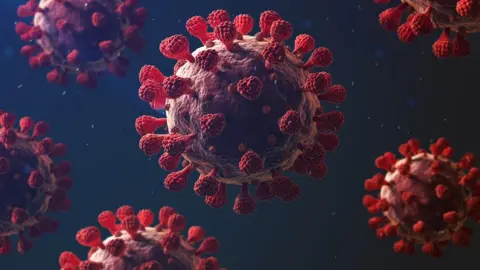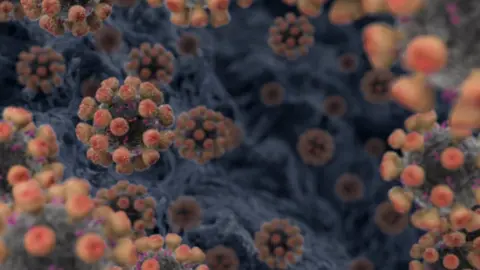Covid: Why is coronavirus such a threat?
 Getty Images
Getty ImagesA simple virus has brought life as we know it to a screeching halt.
We have faced viral threats before, including pandemics, yet the world does not shut down for every new infection or flu season.
So what is it about this coronavirus? What are the quirks of its biology that pose a unique threat to our bodies and our lives?
Master of deception
In the early stages of an infection the virus is able to deceive the body.
Coronavirus can be running rampant in our lungs and airways and yet our immune system thinks everything is a-ok.
"This virus is brilliant, it allows you to have a viral factory in your nose and feel completely well," says Prof Paul Lehner from the University of Cambridge.
Our body's cells start releasing chemicals - called interferons - once they are being hijacked by a virus and this is a warning signal to the rest of the body and the immune system.
But the coronavirus has an "amazing capability" of switching off this chemical warning, Prof Lehner says, "it does it so well you don't even know you're ill".
He says when you look at infected cells in the laboratory you cannot tell they have been infected and yet tests show they are "screaming with virus" and this is just one of the "joker cards" the virus can play.
It behaves like a 'hit and run' killer
The amount of virus in our body begins to peak the day before we begin to get sick.
But it takes at least a week before Covid progresses to the point where people need hospital treatment.
"This is a really brilliant evolutionary tactic - you don't go to bed, you go out and have a good time," says Prof Lehner.
So the virus is like a dangerous driver fleeing the scene - the virus has moved on to the next victim long before we either recover or die.
In stark terms, "the virus doesn't care" if you die, says Prof Lehner, "this is a hit and run virus".
This is a massive contrast with the original Sars-coronavirus, back in 2002. It was most infectious days after people became ill, so they were easy to isolate.
 Getty Images
Getty ImagesIt's new, so our bodies are unprepared
Remember the last pandemic? In 2009 there were huge fears about H1N1, aka swine flu.
However, it turned out to be no way near as deadly as anticipated because older people already had some protection. The new strain was similar enough to some that had been encountered in the past.
There are four other human coronaviruses, which cause common cold symptoms.
Prof Tracy Hussell from the University of Manchester, said: "This is a new one, so we don't think there's much prior immunity there."
The newness of Sars-CoV-2, to give it the official name, she says, can be "quite a shock to your immune system".
This lack of prior-protection is comparable to when Europeans took smallpox with them to the New World, with deadly consequences.
Building an immune defence from scratch is a real problem for older people, as their immune system is slow off the mark.
Learning to fight a new infection involves a lot of trial and error from the immune system.
But in older age we produce a less diverse pool of T-cells - a core component of the immune system - so it is harder to find ones that can defend against Coronavirus.
It does peculiar and unexpected things to the body
Covid starts off as a lung disease (even there it does strange and unusual things) and can affect the whole body.
Prof Mauro Giacca, from King's College London, says many aspects of Covid are "unique" to the disease, indeed "it is different from any other common viral disease".
He says the virus does more than simply kill lung cells, it corrupts them too. Cells have been seen fusing together into massive and malfunctioning cells - called syncytia - that seem to stick around.
And Prof Giacca says you can have "complete regeneration" of the lungs after severe flu, but "this does not happen" with Covid.
"It is quite a peculiar infection," he said.
Blood clotting also goes strangely awry in Covid, with stories of doctors unable to get a line into a patient because it is immediately blocked with clotted blood.
Clotting chemicals in the blood are "200%, 300%, 400% higher" than normal in some Covid patients, says Prof Beverly Hunt from King's College London.
She told Inside Health: "Quite honestly, in a very long career, I've never seen any group of patients with such sticky blood."
These whole-body effects could be due to the cellular doorway the virus strolls through to infect our cells - called the ACE2 receptor. It is found throughout the body including in blood vessels, the liver and kidneys, as well as the lungs.
The virus can cause runaway inflammation in some patients, making the immune system go into overdrive, with damaging consequences for the rest of the body.
And we're fatter than we should be
Covid is worse if you are obese, as a generous waistline increases the risk of needing intensive care, or death.
This is unusual.
"Its very strong association with obesity is something we haven't seen with other viral infections. With other lung injuries, obese people often do better rather than worse," said Prof Sir Stephen O'Rahilly, from the University of Cambridge.
"It looks pretty specific [to Covid] it probably happens in pandemic flu, but not regular flu."
Fat deposited throughout the body, in organs like the liver, causes a metabolic disturbance which seems to combine badly with coronavirus.
Obese patients are more likely to have higher levels of inflammation in the body and proteins that can lead to clotting.
James Gallagher is a BBC Health and science correspondent in London. He is also the presenter of Radio 4's The Second Genome and The Inflamed Mind.
Follow James on Twitter
